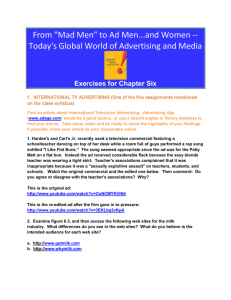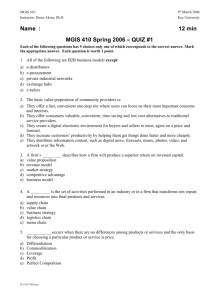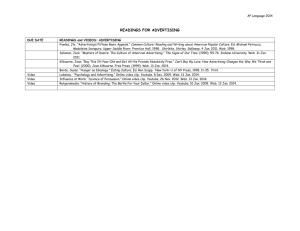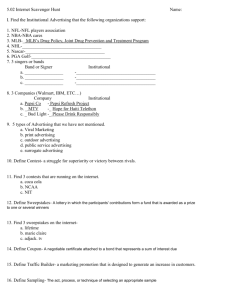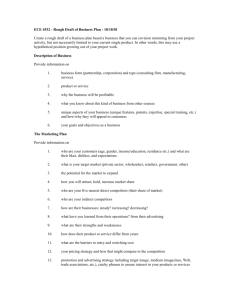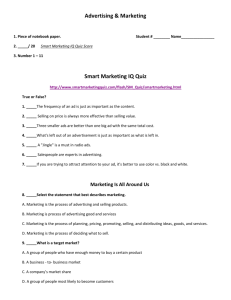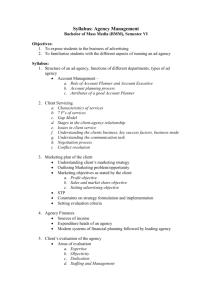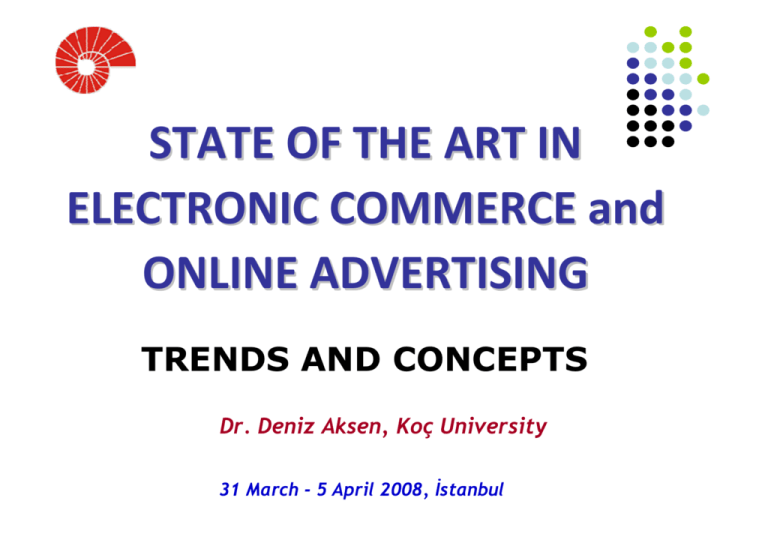
STATE OF THE ART IN ELECTRONIC COMMERCE and ONLINE ADVERTISING
TRENDS AND CONCEPTS
Dr. Deniz Aksen, Koç University
31 March - 5 April 2008, İstanbul
Contents
E-commerce Defined and Reviewed
Stimuli Behind E-commerce in Türkiye
Advertising Online vs. in Traditional Media
Interactive Advertising Bureau
Pharmaceutics Advertising and the Internet
Current Trends in E-commerce
2
April 2, 2008
Deniz Aksen
ELECTRONIC COMMERCE and ONLINE ADVERTISING
E‐COMMERCE DEFINED AND REVIEWED
3
April 2, 2008
Deniz Aksen
E‐commerce Defined and Reviewed
E-commerce Developments and Themes
The Internet and the World Wide Web
Era I and Era II in E-commerce and Prediction for
the Future
E-commerce vs. E-business
Unique Features of E-commerce
Types of E-commerce
Revenue Models in E-Commerce
Source: Kenneth C. Laudon Carol Guercio Traver
E-COMMERCE : business, technology, society
Pearson - Addison Wesley
(3rd Edition)
URL: http://vig.prenhall.com/catalog/academic/product/0,1144,0131735160-IS,00.html
4
April 2, 2008
Deniz Aksen
E‐commerce Developments 2006
More and more people and businesses are using the Internet to
conduct commerce.
The e-commerce channel is deepening as more products and
services come online.
Broadband and wireless Internet access are growing.
E-commerce business models are being refined to achieve higher
levels of profitability.
At societal level, there is continued conflict over copyrights,
content regulation, taxation, privacy, and Internet fraud and
abuse.
5
April 2, 2008
Deniz Aksen
E‐commerce Themes 2006
Technology: Development and mastery of digital computing and
communications technology.
Business: New technologies present businesses and
entrepreneurs with new ways of organizing production and
transacting business.
Society: Intellectual property, individual privacy, and public
policy.
6
April 2, 2008
Deniz Aksen
Disciplines Concerned With E‐
commerce
7
April 2, 2008
Deniz Aksen
Growth of the Internet
8
A worldwide network of computer networks built on common
standards.
Was created for military and academic data transfer
in 1969 as ARPANET.
Services include the Web, e-mail, file transfers, etc.
Can measure growth of Internet by looking at number of
Internet hosts with domain names.
April 2, 2008
Deniz Aksen
Growth of the Internet
Number of Internet Hosts with Domain Names
Source: Internet Systems Consortium, Inc. (www.isoc.org), 2005.
9
April 2, 2008
Deniz Aksen
Growth of the World Wide Web
The most popular service on the Internet.
Developed in early 1990s.
Provides access to Web pages (documents created with HTML).
Can include text, graphics, animations, music, videos.
Web content in form of Web pages has grown exponentially, from
over 2 billion pages in 2000 to over 8 billion pages in 2005.
10
April 2, 2008
Deniz Aksen
Growth of the Web Content
Source: Based on data from Google Inc., 2005.
11
April 2, 2008
Deniz Aksen
Origins and Growth of E‐commerce
Precursors to e-commerce include
Ö
Baxter Healthcare
Ö
Electronic Data Interchange (EDI)
Ö
French Minitel (1980s videotext system; still in use today)
None of these precursor systems had the functionality of the
Internet.
For our purposes, we date the beginning of e-commerce to 1995.
Since then, has been fastest growing form of commerce in United
States.
12
April 2, 2008
Deniz Aksen
The Growth of B2C E‐commerce
Source:
Based on data from eMarketer, Inc., 2005a; Shop.org and Forrester Research, 2005;
Forrester Research, 2004.
13
April 2, 2008
Deniz Aksen
The Growth of B2B E‐commerce
Source:
14
Based on data from e-Marketer, Inc., 2005; U.S. Department of Commerce, 2005;
authors’ estimates.
April 2, 2008
Deniz Aksen
Potential Limitations on the Growth of B2C E‐commerce
Expensive technology
Complex software interface
Sophisticated skill set
Persistent cultural attraction of physical markets and traditional
shopping experiences
Persistent global inequality limiting access to telephones and
computers
15
April 2, 2008
Deniz Aksen
E‐commerce I and E‐commerce II
E-commerce I: A period of explosive growth and
extraordinary innovation; key concepts developed and
explored.
¾
Begins in 1995, ends in March 2000 when stock market
valuations for dot.com companies begin to collapse
¾
Thousands of dot.com companies formed, backed by over
$125 billion in financial capital
E-commerce II: Characterized by a reassessment of ecommerce companies and their value.
¾
16
Begins in January 2001; ongoing
April 2, 2008
Deniz Aksen
E‐commerce II: 2001‐2007
Crash in stock market values for e-commerce companies
throughout 2000 marks end of E-commerce I period.
Reasons for crash:
17
Run-up in technology stocks due to enormous information technology
capital expenditure of firms rebuilding their internal business systems to
withstand Y2K.
Telecommunications industry had built excess capacity in high-speed fiber
optic networks.
1999 Christmas season provided less sales growth that anticipated and
demonstrated e-commerce was not easy (eToys.com, Pets.com)
Valuations of dot.com and technology companies had risen so high
supporters were questioning whether earnings could justify the prices of
the shares.
April 2, 2008
Deniz Aksen
E‐commerce I and E‐commerce II Compared
18
April 2, 2008
Deniz Aksen
Quarterly Amounts Raised by Venture‐Backed Firms
Source: Based on data from MoneyTreeTM Survey, 2005
19
April 2, 2008
Deniz Aksen
Predictions for the Future
20
Technology of e-commerce will continue to propagate through
all commercial activity
E-commerce prices will rise to cover the real cost of doing
business on Web and pay investors reasonable rate of return
E-commerce margins and profits will rise to levels more typical
of all retailers
In B2C and B2B, traditional Fortune 500 companies will play
growing and dominant role
Number of successful pure online companies will decline and
most successful e-commerce firms will adopt mixed “clicks and
bricks” strategies
Growth of regulatory activity worldwide
April 2, 2008
Deniz Aksen
Predictions for the Future
Visibility
Excessive Expectations
Culmination
US IPOs
Real
E-biz
E-commerce
Optimization
Dot.Com
Dot.Com
Failure
DotCom
Start
Start of the
Internet
Failure analysis &
awareness
ill
H
t
en
tm
h
lig
n
E
Internet
WWW
Disappointment Pit
1990 –1996 1997 1998 1999 2000 2001 2002 2003 2004 2005 2006 2007 2008 2009 2010
Technological
Jump
Excessive
Expectations
Re-organization
Maturity of concepts &
Development
Profitability &
Productivity
Source: Serkan Yılankaya from Siemens, December 2004
21
April 2, 2008
Deniz Aksen
E‐commerce Defined
E-commerce involves digitally enabled commercial transactions
between and among organizations and individuals.
Digitally enabled transactions include all transactions mediated
by digital technology.
Commercial transactions involve the exchange of value across
organizational or individual boundaries in return for products or
services.
22
April 2, 2008
Deniz Aksen
E‐commerce vs. E‐Business
23
E-business: primarily refers to the digital enablement of
transactions and processes within a firm, involving information
systems under the control of the firm.
E-business does not include commercial transactions involving an
exchange of value across organizational boundaries.
April 2, 2008
Deniz Aksen
Seven Unique Features of E‐commerce Technology
24
1.
Is ubiquitous (available everywhere, all the time).
2.
Offers global reach (across cultural/national boundaries).
3.
Operates according to universal standards (lowers market entry
for merchants and search costs for consumers).
4.
Provides information richness (more powerful selling
environment).
5.
Is interactive (can simulate face-to-face experience, but on a
global scale).
6.
Increases information density (amount and quality of
information available to all market participants).
7.
Permits personalization/customization.
April 2, 2008
Deniz Aksen
Seven Unique Features of E‐commerce Technology
25
April 2, 2008
Deniz Aksen
The Changing Trade‐off between Richness and Reach
26
April 2, 2008
Deniz Aksen
Types of E‐commerce
Classified by nature of market relationship
Business-to-Consumer (B2C)
Business-to-Business (B2B)
Consumer-to-Consumer (C2C)
Government-to-Citizen (G2C)
Donor-to-Organization (D2O)
Classified by type of technology used
27
Peer-to-Peer (P2P)
Mobile commerce (M-commerce)
April 2, 2008
Deniz Aksen
Revenue Models in E‐commerce
Describes how the firm will earn revenue, generate profits,
and produce a superior return on invested capital.
Terms financial model and revenue model often used
interchangeably.
Major types:
Advertising revenue model
Subscription revenue model
Transaction fee revenue model
Sales revenue model
Affiliate revenue model
28
April 2, 2008
Deniz Aksen
Revenue Models in E‐commerce
Advertising Revenue Model
¾
¾
¾
29
Example: Yahoo.com, Google.com, Hurriyet.com.tr, DoubleClick.com etc.
Sales Revenue Model
¾
Web site that offers content, services and/or products also provides a forum
for advertisements and receives fees from advertisers.
Company derives revenue by selling goods, information, or services to
customers.
Example: Amazon.com and its followers
Transaction Fee Revenue Model
¾
Company that receives a fee for enabling or executing a transaction.
¾
Example: eBay.com, E-Trade.com, GittiGidiyor.com, Sahibinden.com
April 2, 2008
Deniz Aksen
Revenue Models in E‐commerce
Subscription Revenue Model
¾
¾
¾
30
Example: ConsumerReports.org, Experts-Exchange.com, Adac.de,
WSJ.com, HarvardBusinessReview.com (Harvard Business Online)
Affiliate Revenue Model
¾
Web site that offers users content or services charges a subscription fee for
access to some or all of its offerings.
Sites that steer business to an “affiliate” receive a referral fee or percentage
of the revenue from any resulting sales.
Example: MyPoints.com, Milliyet Advertisings, Google Adwords
Hybrid Revenue Models
¾
Merges more than one revenue models in its e-commerce business model.
¾
Example: Sanalsa.com, Altivi.com
April 2, 2008
Deniz Aksen
Five Primary Revenue Models
31
April 2, 2008
Deniz Aksen
ELECTRONIC COMMERCE and ONLINE ADVERTISING
STIMULA BEHIND E‐COMMERCE IN TÜRKİYE
32
April 2, 2008
Deniz Aksen
Stimula Behind E‐commerce in TR
GDP (US$ in Billions - PPP) – Top 20 Countries
Population (Millions) – Top 20 Countries
Young population with median
age of 25
¾ 37% of population younger
than 19
¾ 55% of population younger
than 30
450
1,300
400
350
300
14,000
6,000
GDP CAGR 7.5% (since 2001)
$9.6 bn direct foreign investment
Inflation down to less than 10%
Fully developed financial markets
32 million Credit Cards
54 million mobile phone users
5,000
4,000
250
3,000
200
150
2,000
100
70.4
1,000
$627
50
Source: CIA World Fact book
33
Argentina
Iran
Turkey
Australia
Taiwan
Spain
Mexico
Canada
Korea, South
Brazil
Russia
Italy
France
United Kingdom
Germany
India
Japan
China
0
United States
France
Thailand
Iran
Turkey
Ethiopia
Egypt
Germany
Vietnam
Philippines
Mexico
Japan
Nigeria
Russia
Bangladesh
Pakistan
Brazil
Indonesia
United States
India
China
0
CAGR: Compound Annual Growth Rate
April 2, 2008
Deniz Aksen
Stimula Behind E‐commerce in TR
32.6
28.0
27.3
48.6% median
penetration in Europe
45.0%
38.0%
17.1
14.0
7.0
55.0%
45.0%
23.1
21.0
10.2
4.3
5.2
6.1%
7.2%
65.0%
32.5%
35.0%
24.3%
Penetration
Internet Users (Millions)
35.0
25.0%
14.0%
15.0%
0.0
5.0%
2003
2004
2005
2006
2007E
2008E
2009E
Source: CIA World Fact Book, Google Turkey, GittiGidiyor estimates,
and www.internetworldstats.com for Europe median
34
April 2, 2008
Deniz Aksen
Stimula Behind E‐commerce in TR
E-commerce Volume (1) ($ in millions)
Relative Growth Rates
$1,800
$1,574
$1,500
03 - 06 CAGR: 108%
32.0
GittiGidiyor continues to gain
market share with above
average (both users and ecommerce) growth rates
$1,200
$910
Gravy
$900
eCommerce
Users
$600
$300
$429
9.0
$0
2.5
4.0
2.4
1.2
2003
2004
2005
2006
2003
Transactions over Virtual Point of Sales
(VPOS) reported by local banks
CAGR: Compound Annual Growth Rate
35
5.2
5.1
$175
1.0
(1)
13.7
MSN Turkey
HemalHemsat.com
July 2004
April 2, 2008
2004
2005
Nevaria.com
Sep 2005
2006
Google Turkey
June 2006
Deniz Aksen
Stimula Behind E‐commerce in TR
Growth of the Internet access in Türkiye
Jakob Nielsen’s Law of Bandwidth
[Maximum] available bandwidth increases every year by 50%.
Lowest nominal ADSL bandwidth in late 2004
128 Kbps for 49 YTL/month
Lowest nominal ADSL bandwidth since end of 2006:
1024 Kbps (1 Mbps) for 29-49 YTL/month
36
April 2, 2008
Deniz Aksen
Stimula Behind E‐commerce in TR
Growth of the Internet access in Türkiye
In Türkiye:
Total bandwidth provided by Türk Telekom
In 2004: 8.5 Gbps
In 2005: 19.5 Gbps
By the end of 2005: 33 Gbps
Today: 157 Gbps as of March 4, 2008
Planned for the end of 2008: 350 Gbps
But still broadband Internet access is a premium commodity for home
users in TR.
37
April 2, 2008
Deniz Aksen
Broadband Internet Access in TR
Penetration of Broadband Internet Access in Europe
No. broadband access lines
2007 Q1
2007 Q3
% change
84 million
92 million
10%
Europe
Türkiye
Every 5th citizen
Every 5th household
Common Carriers’ Share
46%
97%
Other Telecom Operators’ Share
54%
3%
Subterrain Copper UTP Wires
~67%
~100%
Fiber Optic, Coaxial Cable, Satellite, Wi-Fi
~33%
~0%
Broadband Access Services received by
Source: European Competitive Telecommunications Association Report
http://teknoloji.milliyet.com.tr/detay.asp?prm=0,5924582&id=4157
38
April 2, 2008
Deniz Aksen
Broadband Internet Access in TR
Penetration of Broadband Internet Access in Europe
Country Rank
Percentage of population with
Broadband Internet Access in 2007 Q3
Denmark
1
34.5
Netherlands
2
33.9
Finland
3
29.9
.
.
.
.
.
.
.
.
.
Turkey
23
5.1
Source: European Competitive Telecommunications Association Report
http://teknoloji.milliyet.com.tr/detay.asp?prm=0,5924582&id=4157
39
April 2, 2008
Deniz Aksen
Stimula Behind E‐commerce in TR
New Internet technologies in Türkiye
GPRS, 2.5G, EDGE, Blueberry by the GSM operators
Cable Modem by Kablonet, ADSL and G.SHDSL by TTNet
Wi-Fi (IEEE 802.11b and IEEE 802.11g protocols)
WiMAX by SuperOnline
VoIP by numerous telecom companies
IPTV by SuperOnline
Metro Ethernet, ADSL2 and VDSL (planned for 2009)
40
April 2, 2008
Deniz Aksen
ELECTRONIC COMMERCE and ONLINE ADVERTISING
ADVERTISING ONLINE vs. IN TRADITIONAL MEDIA
41
April 2, 2008
Deniz Aksen
Forms of Online Advertisements
Display and rich media ads
Banner ads
Pop-ups and pop-unders
Employ Adobe (Macromedia) Flash, DHTML, Java, streaming audio
and/or video (Shoutcast), AJAX
Interstitial Ads and Superstitial Ads
Online catalogs
Search engine advertising: Paid search engine inclusion and
placement
Paid inclusion
Paid placement
Keyword advertising…………………………(Google Adwords)
Network keyword advertising …………(Google AdSense)
42
April 2, 2008
Deniz Aksen
Forms of Online Advertisements
Sponsorships
Referrals (affiliate relationship marketing)
E-mail marketing
Reason why 70% of email traffic is made of spam despite anti-spam
databases, anti-spam filters and anti-spam websites. Online catalogs
Online chat
IM (instant messaging, IRC) and voice chat via VoIP
Blog and Vlog Advertising………… YouTube.com, Facebook.com
43
April 2, 2008
Deniz Aksen
Forms of Online Advertisements
Source: Based on data from MessageLabs.com, 2005.
44
April 2, 2008
Deniz Aksen
Forms of Online Advertisements
Spam Categories
Source: Based on data from Symantec, 2005b, 2005c; Dunn, 2005.
45
April 2, 2008
Deniz Aksen
Internet Advertising in the USA
BACK IN AUG 2001
JUPITER MEDIA RESEARCH
“The Internet audience and the time it
spends on the Net have continued to grow
at low double-digit rates. This will, like a
force of nature, attract more ad spending
and increase rates.
Despite the lack of standards, advertisers
have been incorporating the Internet into
their overall media mix.”
VERONIS SUHLER
Source:
“Internet Advertising: Looking For How Low Is Up”
“The double-digit growth, particularly of
time spent online, has nonetheless been
slowing. Advertisers won't open their
wallets wider until they are better able to
gauge the effectiveness of Internet
advertising.”
by David Simons from Forbes, Aug 15, 2001
URL: http://www.forbes.com/2001/08/15/0815simons.html
46
April 2, 2008
Deniz Aksen
Internet Advertising in Europe
Sources:
1. AGB Nielsen Media Research AdRelevance
2. JupiterMedia / JupiterResearch
Cited in “Online advertising rising quickly in Europe,”
by Rob Rose from Internet.com
http://turk.internet.com/haber/yazigoster.php3?yaziid=11772
47
April 2, 2008
Deniz Aksen
Veronis Suhler Stevenson Estimates in 2007
Veronis Suhler Stevenson, Inc. (vss.com)::
a private equity and capital firm that invests buyout and structured capital funds in the
media, communications, information and education industries in North America and
Europe.
• Total communications spending expanded at a CAGR of 5.9% in the
2001-2006 period to a record US$ 885.2 billion.
• Overall communications spending is projected to grow 6.4% in 2007,
exceed US$ 1 trillion in 2008, and post a CAGR of 6.7% from 2006 to
2011.
• The U.S. market for Internet advertising was approximately $18 billion
in 2006, and was expected to grow 20% annually over the next 5 years.
48
April 2, 2008
Deniz Aksen
Veronis Suhler Stevenson Estimates in 2007
• If pure-play online advertising were combined with advertising on traditional
media online platforms, overall Internet advertising is expected to capture US$ 62
billion and become the largest ad segment in 2011.
— corresponding to 21.2% CAGR during the 2006-2011 period,
— surpassing newspapers and magazines’ US$ 60 billion print advertising.
• Broadcast television and cable and satellite television combined will continue to
take the biggest share of advertising dollars, and are forecast to reach US$ 86
billion in 2011.
• James Rutherfurd, managing director at VSS:
“The path of online advertising and newspaper advertising is a continuation of
what we’ve been observing for many years, but it is finally getting to the point
where the lines will cross.”
49
April 2, 2008
Deniz Aksen
Veronis Suhler Stevenson Estimates in 2007
• The shift in advertising spending from traditional media to online and digital
alternatives is taking place across the globe. Already, some forecasters expect
newspaper advertising to be overtaken by online spending in the UK and Sweden
in 2007.
• The survey also measured the time spent on different media, and in 2007 the
amount of time spent reading newspapers is expected for the first time to be
overtaken by time spent online.
50
April 2, 2008
Deniz Aksen
Veronis Suhler Stevenson Estimates in 2007
• In 2006, media usage per person per year declined 0.5% to 3,530 hours. The
study found that while people typically watched television for at least 30 minutes
per session, they tended to watch user-generated video clips on the web for five
to seven minutes.
• The use of media in the workplace increased, however, up 3.2% to 260 hours
per employee per year, VSS found.
Sources: 1. VSS.com, 7 Aug 2007, http://www.vss.com/news/index.asp?d_News_ID=166
2. “Online ads to overtake US newspapers,” by Aline van Duyn,
Financial Times, 7 Aug 2007,
http://www.ft.com/cms/s/0/6098d396-4448-11dc-90ca-0000779fd2ac.html
51
April 2, 2008
Deniz Aksen
Advertising Online vs. in Traditional Media
• Basically, online video is poised to hit a tipping point similar to that which online
advertising is. Granted, with 77.5% and 62.2% of users find it intrusive and
disruptive respectively, the future of ad supported video doesn't look great.
— But ad supported video isn't synonymous with online video.
— Just because the videos themselves won't be ad supported, that doesn't
mean that online video as a medium isn't going to intensify the growth on the
online advertising industry.
• This is why the new media is multi media. Basically, online media can support
mediums that can compete with all of its conventional counterparts
simultaneously.
— Online publishers have thrice the opportunity to appeal to advertisers than
their mainstream counterparts.
52
April 2, 2008
Deniz Aksen
Advertising Online vs. in Traditional Media
• If users/consumers are spending less time with media because of online media,
then, it stands to reason that the latter is going to begin capturing a larger and
larger share of the potential audience. What that means for advertisers is that
they'll have more of an opportunity to reach that audience via online media than
they would through network, cable, or satellite television because online media
can do video and more.
• It is, therefore, not unreasonable to conjecture that the gap between the size of
television advertising and online advertising may be considerably smaller than
VSS has projected.
Source: “Online advertising may grow quicker than projected,”
SearchAnyway.com, 7 Aug 2007,
http://blog.searchanyway.com/2007/08/online_advertising_may_grow_qu.html
http://blog.searchanyway.com/2007/08/future_of_online_video.html
http://gypsybandito.com/new-media-is-multi-media/
53
April 2, 2008
Deniz Aksen
Internet Marketing and Advertising In TR
Total
Year Advertising
Expenditures
54
Internet
Advertising
Share
Source of
Information
2002
-
US$ 7.5 mn
0.5%
Mynet.com’s
estimate
2003
US$ 870 mn
US$ 8.12 mn
0.9%
Turk.internet.com
2006
-
US$ 20-22.5 mn
-
2007
-
US$ 40 (est.)
1.2%
2010
US$ 200 mn (est.)
2013
US$ 160-180 mn (est.)
April 2, 2008
Deniz Aksen
Turkish Internet Advertising Expenditures in 2003
55
http://turk.internet.com/haber/yazigoster.php3?yaziid=9234
Source: Elmira Tunga, Turk.Internet.com
Branch
Budget Allocated for Internet
Share
Advertising [million US$]
Casino, Gambling
1.40
17%
GSM Services
1.25
15%
Banking Services
1.07
13%
Other
1.05
13%
Automotive
0.75
9%
IT
0.50
6%
Mobile Phones Sellers
0.50
6%
Tourism and Transportation
0.50
6%
FMCG
0.25
3%
Food
0.25
3%
Green Card Companies
0.20
3%
Political Parties and Org.
0.20
3%
Alcoholic Beverage Prod.
0.20
3%
TOTAL
8.12
100%
April 2, 2008
Deniz Aksen
ELECTRONIC COMMERCE and ONLINE ADVERTISING
INTERACTIVE ADVERTISING BUREAU
(IAB)
56
April 2, 2008
Deniz Aksen
Interactive Advertising Bureau Estimates in 2006
Greg Stuart : CEO of Interactive Advertising Bureau (IAB) in the USA
• IAB founded in 1996 in the USA, operating today in 26 countries.
• ROI of Internet advertising is high.
• U.S. market for Internet advertising: 12 billion US$, 30% annual growth.
• used to be 9.9 billion US$ in 2005.
• Internet advertising market in TR: 12 million US$, 50% annual growth.
• Internet is the medium for SMBs to make international marketing.
• IAB Türkiye will be founded soon to create, regulate, measure, and
finally audit Internet ads and ad standards in TR.
Source: Cüneyt Uzunoğulları, Hürriyet USA, Jan 16 2006
http://www.hurriyetusa.com/haber/haber_detay.asp?id=7255
57
April 2, 2008
Deniz Aksen
Arrival of the Interactive Advertising Bureau in TR
• IAB Türkiye has been founded with 23 members on 20th October 2007
and made its first board meeting on 22nd October.
• With IAB Türkiye founded, now not only domestic but also international
ad givers are expected to turn their attention to the Internet ad market in
Türkiye.
• Ratio of Internet Advertising Expenditures in 2007 (estimates of IAB)
UK …………………….…………………… 11.4%
USA and France ……………………… 5.9%
Germany …………….…………………… 4.4%
Türkiye ……………….…………………… 1.2% (used to be 0.5% in 2002)
Source: IAB press release published on Sporx.com,
http://www.sporx.com/detail.php?Type=1&kategori=134&go=84913
58
April 2, 2008
Deniz Aksen
Arrival of the Interactive Advertising Bureau in TR
• An example regulation enforced by IAB: BANNER AD DIMENSIONS
Explained by Hakan Kalmış at Grafikerler.net:
http://www.grafikerler.net/banner-reklamlar-uzerine-bir-inceleme-t2888.html?t=2888
Rectangles ve Pop-Ups
Banners ve Buttons
• 300 x 250 IMU - (Medium Rectangle)
• 468 x 60 IMU - (Full Banner)
• 250 x 250 IMU - (Square Pop-Up)
• 234 x 60 IMU - (Half Banner)
• 240 x 400 IMU - (Vertical Rectangle)
• 88 x 31 IMU - (Micro Bar)
• 336 x 280 IMU - (Large Rectangle)
• 120 x 90 IMU - (Button 1)
• 180 x 150 IMU - (Rectangle)
• 120 x 60 IMU - (Button 2)
• 120 x 240 IMU - (Vertical Banner)
Skyscraper Banners
• 125 x 125 IMU - (Square Button)
• 160 x 600 IMU - (Wide Skyscraper)
• 728 x 90 IMU - (Leaderboard)
• 120 x 600 IMU - (Skyscraper)
• 300 x 600 IMU - (Half Page Ad)
Source: IAB Standards and Guidelines - Universal Ad Packages
http://www.iab.net/iab_products_and_industry_services/1421/1443/1452
59
April 2, 2008
Deniz Aksen
60
April 2, 2008
Deniz Aksen
ELECTRONIC COMMERCE and ONLINE ADVERTISING
PHARMACEUTICS ADVERTISING AND THE INTERNET
61
April 2, 2008
Deniz Aksen
Pharmaceutics Advertising and the Internet
INTERNET
— the only gateway to pharmaceutical promotion
Drug advertising on the TV, radio, billboards, and other printed media forbidden.
Only informational web sites called E-DETAILING WEBSITES geared towards
doctors and patients allowed.
Also about specific diseases and disorders
Most active advertising company in this field: MAGICLICK
Delivering ad campaign projects for the last 10 years
62
April 2, 2008
Deniz Aksen
Pharmaceutics Advertising and the Internet
INTERNET
— the only gateway to pharmaceutical promotion
Murat Kalaora from MAGICLICK (http://magiclick.com.tr/)
“We support pharmaceutical companies in the fields of promotion, PR, and
online marketing campaigns.”
“We provide e-business consulting, website design and development, and
website content management services to them.”
“Our websites address both the public and the doctors with interactive
infotainment content.”
¾ INFOTAINMENT: information and entertainment
“The portals prepared for the promotion of a drug or a group of drugs also
serve as a reference point for the public as well as for the health
professionals.”
63
April 2, 2008
Deniz Aksen
Pharmaceutics Advertising and the Internet
INTERNET
— the only gateway to pharmaceutical promotion
Murat Kalaora from MAGICLICK :: ADVERGAMES with MEDICINE
“Companies often use advergames to establish one-to-one relationships
with the visitors of our pharmaceutical portals.
“All marketing research conducted in the pharmacy industry has shown
corporate websites and extranets are ineffective in marketing a new
medicine.”
“Websites or portals that are positioned independent of the actual corporate
website around the treatment with a specific drug produce much more
results.”
64
April 2, 2008
Deniz Aksen
Pharmaceutics Advertising and the Internet
INTERNET
— the only gateway to pharmaceutical promotion
Emre Gürül from NEXUM CREATIVE (http://www.nexumcreative.com/)
“Companies prefer the Internet because:
¾ By default they target a clientele with higher education.
¾ Their target clientele uses the Internet frequently both in their profession
and in their private life.
¾ Doctors would first check the website of the company that produces a
particular medicine.
¾ Doctors widely watch and use online video and animated multimedia that
explain the side and adverse effects of a medicine.”
Source: “Gençleri hedefleyen markalar sanal reklamlara yöneliyor,”
Nazlı Topçuoğlu, Referans, Sep 19 2007,
URL: http://www.halklailiskiler.com.tr/detay.asp?id=3077
65
April 2, 2008
Deniz Aksen
Turkish Legislation of Pharmaceutical
Advertising on the Internet
T.C. RESMİ GAZETE
Regulations About the Advertising Activities of Medicine for Humans,
Date: Oct 23 2003 Thu, Issue: 25268
Article 17. Use of the Internet in Advertising
Association of Research-Based Pharmaceutical Companies
AİFD (Araştırmacı İlaç Firmaları Derneği, AIFD.org.tr)
Principles and Ethics of Advertising of Pharmaceutical Products
URL: 1. http://www.aifd.org.tr/Hakkimizda/Tanitim-ilkeleri.aspx
2. http://www.aifd.org.tr/pdf/tanitim_ilkeleri.pdf
66
April 2, 2008
Deniz Aksen
Further Readings on Internet Advertising
and E-Marketing
http://turk.internet.com/category.php?cat=7
Research Papers
News articles
Columns
Interviews
Technical Tips and Info
Events
Activities
Corporate News
Campaigns
Human Resources
Partnerships and Acquisitions
Charity
Company Lists
67
April 2, 2008
Deniz Aksen
ELECTRONIC COMMERCE and ONLINE ADVERTISING
CURRENT TRENDS IN E‐COMMERCE
68
April 2, 2008
Deniz Aksen
Current Trends in E-commerce
Web Presence with Sentences as Domain Names
Left-Brain Marketing
Web Analytics
Clickstream Analysis
Search Engine Marketing (SEM)
Search Engine Optimization (SEO)
Establishing Demographics
On-Demand CRM
69
April 2, 2008
Deniz Aksen
Web Presence
The Web Site as a Corporate Real Estate and
as a Marketing Communications Tool
¾
¾
Web site can be viewed as an extended online advertisement.
Domain name: First communication an e-commerce site has with
a prospective customer.
Web Site Functionality
¾
Factors affecting effectiveness of a software interface:
Utility
Ease of use
¾
Factors in credibility of Web sites:
Design look
Information design/structure
Information focus
Responsiveness
70
April 2, 2008
Deniz Aksen
Web Presence
Mini Case 1 for the mini-MBA :: an ALEXA.COM comparison
KalbiniziKoruyun.org vs. ErkekPermatikKullanir.com vs.
YazikdegilmiCarlosa.com
71
April 2, 2008
Deniz Aksen
Web Presence
Mini Case 2 for the mini-MBA :: an ALEXA.COM comparison
Sabanciuniv.edu vs. Ku.edu.tr vs. Bilgi.edu.tr vs. Bahcesehir.edu.tr
vs. Yeditepe.edu.tr
72
April 2, 2008
Deniz Aksen
Web Presence
Mini Case 3 for the mini-MBA :: an ALEXA.COM comparison
HaberTurk.com vs. Haber7.com vs. NTVMSNBC.com vs.
InternetHaber.com vs. InteraktifHaber.com
73
April 2, 2008
Deniz Aksen
Left-Brain Marketing
Metrics that focus on success of Web site in
achieving audience or market share
74
¾
Impressions
¾
Click-through rate (CTR)
¾
View-through rate (VTR)
¾
Hits
¾
Page views
¾
Stickiness (duration)
¾
Unique visitors
¾
Loyalty
¾
Reach
¾
Recency
April 2, 2008
Deniz Aksen
Left-Brain Marketing
Metrics that focus on success of Web site in
achieving audience or market share
75
¾
Acquisition rate
¾
Conversion rate
¾
Browse-to-buy-ratio
¾
View-to-cart ratio
¾
Cart conversion rate
¾
Checkout conversion rate
¾
Abandonment rate
¾
Retention rate
¾
Attrition rate
April 2, 2008
Deniz Aksen
Left-Brain Marketing
E-mail Metrics
¾
Open rate
¾
Delivery rate
¾
Click-through rate (e-mail)
¾
Bounce-back rate
¾
Unsubscribe rate
¾
Conversion rate (e-mail)
Click-through rates may be low, but these are just one
measure of effectiveness.
Research indicates that most powerful marketing campaigns
include both online and offline advertising.
76
April 2, 2008
Deniz Aksen
An Online Consumer Purchasing Model
77
April 2, 2008
Deniz Aksen
How Well Does Online Advertising Work?
Click-through Rates by Format 2000–2005
Source:
78
Based on data from DoubleClick, 2005, 2004; eMarketer, Inc., 2005h, 2004; authors’
estimates.
April 2, 2008
Deniz Aksen
The Costs of Online Advertising
Cost per thousand (CPM): Advertiser pays for
impressions in 1,000 unit lots.
Cost per click (CPC): Advertiser pays pre-negotiated
fee for each click ad receives.
Also referred to as PPC (pay per click)
Cost per action (CPA): Advertiser pays pre-negotiated
amount only when user performs a specific action.
Hybrid: Two or more of the above models used together.
79
April 2, 2008
Deniz Aksen
Paid Search vs. Natural (Organic) Search
Indeed, an important contribution to the rapid growth of online advertising has
been its ability to more accurately target consumers. Because user are engaging
the media themselves, rather being engaged by them, there is greater opportunity
for advertisers to reach the consumers they care about, and disregard those that
do not fit into their target demographic.
This kind of behavior is explicitly documented by the VSS report, moreover,
when it touches upon search engine marketing. As Search Engine Land notes:
VSS projects paid search will reach roughly $8.7 billion by year end and
$16.7 billion in 2011. The report also projects roughly $6 billion in local
search and online yellow pages spending by 2011. All locally targeted online
ad spending is expected to reach just over $19 billion by 2011.
Source: “Online advertising may grow quicker than projected,”
SearchAnyway.com, 7 Aug 2007,
http://blog.searchanyway.com/2007/08/online_advertising_may_grow_qu.html
80
April 2, 2008
Deniz Aksen
Search Engine Optimization (SEO)
1. Register with as many search engines as possible
2. Ensure that keywords used in Web site description match keywords likely
to be used as search terms by user
3. Link site to as many other sites as possible
4. Get professional help:
81
•
Web Analytics Association (www.WebAnalyticsAssociation.org)
•
Google Analytics (analytics.google.com)
•
Web Trends 8.0 (WebTrends.com)
•
HBX On-Demand Web Analytics (WebSideStory.com)
•
OneStat (OneStat.com)
•
Affinium Enterprise Marketing Platform (UNICA.com)
•
Site Catalyst (Omniture.com)
•
Coremetrics e-marketing platform (Coremetrics.com)
April 2, 2008
Deniz Aksen
Search Engine Optimization (SEO)
A Live Demonstration of
Google Analytics
Analyzed Website:
ODYSSEUS2009.org
ODYSSEUS 2009
Fourth International Workshop on
Freight Transportation and Logistics
Çeşme, İzmir, TURKEY
May 26-29 2009, Tuesday-Friday
) Go to:
www.GoogleAnalytics.com or
Analytics.Google.com or
http://www.google.com/analytics/
82
April 2, 2008
Deniz Aksen
Search Engine Optimization (SEO)
Visual Resources on YouTube
•
Laura Lippay lectures SEO 101 :
http://www.youtube.com/watch?v=uSg5XVXEYe4
•
Web Marketing Today : http://www.youtube.com/user/webmarketingtoday
Introduction to Search Optimization 1:
http://www.youtube.com/watch?v=pbVhctdn8Fc
SEO as Key to E-Commerce Success, AnOccasionalChocolate.com
http://www.youtube.com/watch?v=JGYuVe2w8CA
Comparing Paid Search and SEO with Abe Mezrich
http://www.youtube.com/watch?v=w2edDWwH2O8
Introduction to Web Analytics with Jim Sterne of eMetrics
http://www.youtube.com/watch?v=xBEIydFH1qk
The WAA - Web Analytics Association with Jim Sterne
http://www.youtube.com/watch?v=RuUgJSq0q1Y
•
Web Design Expert - Getting Your Website To Rank High Part 1 :
http://www.youtube.com/watch?v=OnD6ErNjsEo
83
April 2, 2008
Deniz Aksen
Search Engine Optimization (SEO)
Visual Resources on YouTube
•
Sage Lewis Personal and Business Videos (SageRock.com) :
http://www.youtube.com/user/sagerock
Introduction to Search Engine Optimization:
http://www.youtube.com/watch?v=nttfjt46quM
Search Engines Optimization Expectations
http://www.youtube.com/watch?v=9VWkxDHhi1A
Introduction to Search Engine Strategies New York
http://www.youtube.com/watch?v=Ltt6uuwTwF0
Google Analytics Overview - http://www.youtube.com/watch?v=lsPzslyV1U4
84
April 2, 2008
Deniz Aksen
Search Engine Optimization (SEO)
Visual Resources on YouTube
•
SEO Teacher from Israel : http://www.youtube.com/user/SEOTeacher
Into to Web Marketing : http://www.youtube.com/watch?v=EeYDqIe4uSA
Web Marketing For International Businesses - Part A :
http://www.youtube.com/watch?v=mtk_RvfyBpE
Web Marketing For International Businesses - Part B :
http://www.youtube.com/watch?v=gG_995ML66E
SEO 101 - Search Engine Optimization :
http://www.youtube.com/watch?v=opLZEXOsMiE
Meta Tags - http://www.youtube.com/watch?v=NLGjs98zUMQ
85
April 2, 2008
Deniz Aksen
Search Engine Optimization (SEO)
Further Reading
• Marketing Modus Operandi:
http://www.marketingmo.com/
An Introduction to
Search Engine Marketing
http://www.marketingmo.com/resources/search_marketing.aspx
86
April 2, 2008
Deniz Aksen
The Hottest Marketing Trends for 2008
Kim T. Gordon : "Marketing" coach at Entrepreneur.com and a multifaceted marketing
expert, speaker, author and media spokesperson. Over the past 26 years,
she's helped millions of small-business owners increase their success
through her company, National Marketing Federation Inc.
Here are four ways to increase sales and your advertising ROI
1. Engage the customer: The move toward alternative advertising versus some
of the more traditional methods coincides with the emergence of technologies
that enable a one-on-one dialogue with customers. For example, follow the
trend of social media by posting your products on sites that encourage
customer or peer reviews. Social media add an element of impartiality and are
increasingly looked to as reliable sources of information.
87
April 2, 2008
Deniz Aksen
The Hottest Marketing Trends for 2008
Kim T. Gordon : “Here are four ways to increase sales and your advertising ROI”
2. Integrate your off-line and online campaigns: Look for ways to use off-line
media to drive traffic to a website with specialized landing pages that tell a
deeper story. Use print and TV ads to start the customer education process and
direct potential buyers online to learn more and take the next steps in the
purchase process. And direct an e-mail campaign to your current customer
database to offset the cost of direct mail. Simply alternate e-mail and postal mail
for a cost-effective one-two punch.
3. Move some off-line dollars online: Online advertising now offers a strong
alternative to some traditional media, such as print yellow pages. Consider
moving some of your traditional directory advertising dollars into online
directories and search engines. The vast majority of Americans research their
products online before making purchases, so a paid search campaign is an ideal
way to make sure you turn up at the top of search results.
88
April 2, 2008
Deniz Aksen
The Hottest Marketing Trends for 2008
Kim T. Gordon : “Here are four ways to increase sales and your advertising ROI”
4. Follow your customer: Alternative out-of-home advertising opportunities let
you place your message wherever your customers go. You can put your name
and company logo on the umbrellas used by urban street vendors, or name
hiking trails in wilderness areas. The key to using these new opportunities
effectively is to place your message where it will appear in the proper context
and reach your potential customers when they are in the right frame of mind.
Source: “The Hottest Marketing Trends for 2008,”
by Kim T. Gordon, 25 Dec 2007,
http://marketingsalesmanagement.blogspot.com/2007/12/hottest-marketing-trends-for-2008.html
89
April 2, 2008
Deniz Aksen
ELECTRONIC COMMERCE and ONLINE ADVERTISING
THE END
THANK YOU
90
April 2, 2008
Deniz Aksen

